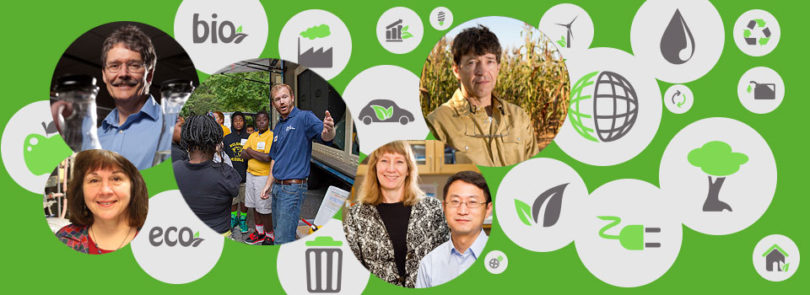University of Georgia researchers are looking to biology for the nation’s-and the world’s-energy future.
The Bioenergy Systems Research Institute, or BSRI, is the focal point for efforts that bring together the university’s legacies in agriculture, forestry, environmental sciences, engineering and agricultural economics with its strengths in carbohydrate science, biochemistry, genetics and microbiology.
Researchers from across the university discover renewable energy solutions, educate and prepare the next generation of renewable energy scientists to find solutions to the world’s energy needs, and collaborate with government, business and academic partners to enhance the nation’s energy security with clean energy.
UGA bioenergy research projects range from basic science to commercial applications. Some lay the foundation for tomorrow’s innovations and policies, while others produce technologies that are already advancing the quality of life in Georgia and the world.
Biofuels, Bioproducts and Biopower
UGA’s bioenergy researchers are helping transform the nation’s renewable and abundant biomass resources into cost-competitive, high-performance biofuels, bioproducts and biopower that are needed to meet growing energy needs.
- Almost 30 biobased technologies have been developed at UGA, with many licensed to the marketplace: genetically modified plants for the production of biofuels and biochemicals, methods for quantitative analysis of biomass, genetically engineered microorganisms for the production of a variety of chemicals from plants, and a process to turn woody waste biomass into a liquid fuel.
- UGA has the largest university contribution to the BioEnergy Science Center, or BESC, a nationwide consortium of universities, federal labs and companies that the U.S. Department of Energy has funded at a level of $250 million over a 10-year period to help make biofuels a cost-effective alternative to fossil fuels.
- A team of UGA researchers who are part of BESC has engineered microbes to directly convert biomass to biofuel without pretreatment. Crossing this hurdle allows the direct conversion of switchgrass to fuel. The effort was led by Janet Westpheling, professor of genetics, Franklin College of Arts and Sciences.
- As part of the BESC project, UGA research scientist Li Tan and professor of biochemistry and molecular biology Deborah Mohnen discovered a plant structure that changes the understanding of the way plants are put together and how they are made. It also opens doors for engineered plants that will work better as a feedstock for the biofuels industry and as better agricultural products.
- An international team of scientists including Andrew Paterson, Regents Professor and director of UGA’s Plant Genome Mapping Laboratory, and other UGA researchers published the genome of Brassica napus-commonly known as canola-in the journal Science. Their discovery paves the way for improved versions of the plant, which is used widely in farming and industry, including for biofuels.
- Researchers led by associate professor of microbiology Joy Peterson have developed a “super strain” of yeast that can efficiently ferment ethanol from pretreated pine-one of the most common species of tree in Georgia and the U.S. Their research could help biofuels replace gasoline as a transportation fuel.
- Professor Michael W.W. Adams and colleagues have found a way to transform the carbon dioxide trapped in the atmosphere into useful industrial products, a discovery that may lead to the creation of biofuels made directly from the carbon dioxide in the air. Adams is Georgia Power Professor of Biotechnology and Distinguished Research Professor of Biochemistry and Molecular Biology in the Franklin College of Arts and Sciences.
- UGA engineers are exploring ways to harvest electricity directly from plants. Led by Ramaraja Ramasamy, assistant professor in UGA College of Engineering, they developed a way to interrupt plant photosynthesis so that electrons could be captured before the plant uses them to make sugars needed for growth and reproduction.
- A Center of Excellence in Renewable Energy, run jointly by UGA and University of Puerto Rico since 2011, focuses on producing biofuels from freshwater microalgae and marine macroalgae. Faculty and students have joint projects that focus on algal cultivation, biomass fractionation, conversion of algae to liquid and gaseous fuels and byproducts.
- UGA engineers Suraj Sharma, College of Family and Consumer Sciences, and K.C. Das, College of Engineering, developed a method to turn algae extracted from wastewater into sustainable bioplastic. UGA graduate Ryan Hunt, who studied with Das, licensed the technology and co-founded Algix. Now based in Mississippi, the company harvests algae from catfish operations, livestock farms and wastewater treatment plants.
The Future of Bioenergy in the South
The American South, home not only to peanuts, corn, pecans and cotton, but also millions of acres of commercial forests, has huge biomass reserves that are among the most significant bioenergy sources in the U.S. Consequently, with the bioenergy industry eyeing the Southeast’s bioenergy reserves for future development, researchers are studying its impact on the environment, as well as public opinion about the biofuel industry.
- Research by Puneet Dwivedi, assistant professor, Warnell School of Forestry and Natural Resources, has found that the wood pellets exported to Europe from the Southern United States to generate electricity are boosting European efforts to cut greenhouse gas emissions.
- A study by researchers from UGA, University of Florida and Virginia Tech found that the rapidly expanding forest biomass energy development in the Southeast has large implications for wildlife and biodiversity. The study will provide guidance for up-front evaluation of risks and opportunities of bioenergy production.
- Researchers from the Center for Integrative Conservation Research conducted in-depth interviews with community members to understand the social and economic factors working for and against new bioenergy developments.
Education for a Sustainable Future
BSRI aims to inform a variety of audiences about bioenergy research, energy concerns and sustainability issues affecting the planet.
- UGA was the lead institution at the inaugural 2012 SEC symposium, “Impact of the Southeast in the World’s Renewable Energy Future.” Researchers from the 14 Southeastern Conference universities discussed the unique energy opportunities within the Southeast, and the obstacles that must be overcome to make renewable energy sources efficient and cost-effective.
- UGA’s Biomanufacturing and Bioprocessing Professional Science Master’s Program brings together scientific, engineering and business faculty to train a cutting-edge biotech workforce. Students in the program, led by Joy Peterson, associate professor of microbiology and director and graduate coordinator of the MBB program, gain access to state-of-the-art equipment, practical training experiences and contacts with the industry that ensure their readiness for the workplace.
- Athens middle-school students experience firsthand how wood and other organic materials generate energy at the annual Bioenergy Day @UGA, an event sponsored by BSRI in collaboration with the Office of Service Learning and the State Botanical Garden. UGA faculty and students guide them through hands-on displays about producing renewable energy from biological sources. Interactive exhibits are developed by staff from the BioEnergy Science Center in collaboration with the Creative Discovery Museum in Chattanooga, Tennessee.






